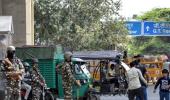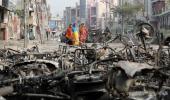The sessions court judge presiding over the trial was appointed to this court just a few months ago.
Annoyed at its slow pace, he is cracking the whip on the prosecution.
Jyoti Punwani reports.

Can a trial that has been delayed for 21 years suddenly be speeded up? Justice delayed is justice denied, but can justice be rushed through?
These questions arise after watching this week's proceedings of the Suleman Usman Bakery trial, where seven policemen are accused of murder. The case against them was filed in 2001, a full eight years after the incident for which they are charged took place.
The sessions court judge presiding over the trial was appointed to this court just a few months ago. Annoyed at its slow pace, he is cracking the whip on the prosecution. Policemen are being ordered to bring witnesses so that hearings can be held every day.
But how do the police find witnesses to an incident that took place 29 years ago?
This week, nine witnesses were supposed to testify. Only three did. The others either could not be traced, or the documents required for their testimony couldn't be traced.
***
The incident concerns a police raid on the Suleman Usman Bakery and an adjacent madarsa situated in Mumbai's old Muslim area, during the post-Babri Masjid 1992-1993 riots. 8 unarmed Muslims with no criminal record were shot dead by the police inside the bakery and madarsa.
The joint commissoner of police R D Tyagi who led the raid claimed that he was forced to order his men to forcibly enter the bakery because policemen were being fired on by sten gun wielding terrorists from the rooftop of the bakery.
But this version was disbelieved by the Justice B N Srikrishna Commission of Inquiry into the riots, which indicted him and two of his aides for excessive and unprovoked firing.
In 2000, under Supreme Court pressure, the Maharashtra government set up a Special Task Force (STF) to act on the Srikrishna Commission Report. The STF investigated the Suleman Usman Bakery raid, and in 2001, charged Tyagi and 17 policemen for murder.
In 2003, Tyagi and eight others were discharged. The remaining nine accused remained to face trial. Two of them have since died.
***
This week, the owner of the bakery testified. Since curfew was on when the raid took place, he was at home. Later, he collected the bodies of five of his workers who were shot dead.
In his statement given to the STF in 2001, Abdul Sattar or Sattar bhai as he is called, had described the blood stained walls and floor of the mezzanine floor of his bakery and its terrace when he visited it after the raid. He had also described the gunshot wounds on the bodies of his workers -- one shot in the skull, others in the back of the chest. Three of them were aged 20, one was 34.
His statement had also recounted what the survivors of the raid had told him about the way the police had barged in, asked them where their weapons were, and shot at them.
However, no part of this graphic picture came through in his testimony in court.
Now 75, Sattar Bhai came to court in a wheelchair. One line ran like a refrain all through his testimony: "I don't remember."
He claimed he could neither remember who had fired on his workers, nor even that his statement had been recorded. What did the bakery look like when he entered it after the raid? He didn't remember.
All he could remember was that he had gone to the J J Hospital morgue and collected the bodies of his workers.
Sattar bhai was declared hostile.
The same man had, in interviews to the media just three years ago, when the trial was set to begin, said that he didn't expect anything to emerge from it given that policemen themselves were rioters. The incident he had said, had given a bad name to his bakery. Later, whenever they used to go to the police for work, they would be blamed for filing the case against them.

***
Two other witnesses testified this week, both policemen. One of them, Ajit Deshmukh was the assistant police inspector, Crime Branch, CID then, and is now retired.
As Tyagi's staff officer at the time, he had accompanied Tyagi to the bakery and even fired one round in the air outside the bakery in self-defence and in order to deter the miscreants, he told the court.
However, though he himself had been part of the team that accompanied Tyagi to the bakery, Deshmukh said he could not identify any of the seven accused policemen in court, all of whom had also been part of the team.
Deshmukh's testimony was almost a verbatim repetition of his statement given to the police in 1993, soon after the raid took place. It reiterated the police version, that the raid was in response to policemen being fired upon from the roof top of the bakery.
Deshmukh told the court that he didn't know if any weapons were found, but those wielding sten guns and revolvers escaped during the raid.
This version had been discounted both by Justice Srikrishna and the STF.
Wrote the Commission: 'After carefully examining the evidence on record, the Commission is of the view that the story of the police does not inspire credence...No member of the police party, nor of public, received any injury as a result of the alleged private firing...The police recovered no firearms whatsoever.'
In its FIR, the STF said the police could produce no evidence to back up their claims.
Deshmukh was one of the three policemen indicted by Justice Srikrishna for this incident. The other two were Tyagi and Inspector Lahane of the Special Operations Squad (SOS) that carried out the raid.
However, the STF didn't make him an accused.
Lahane was discharged along with Tyagi in 2003.
***
The evidence that was recorded this week brought smiles to the defence. "We are ready to wrap up this trial by the end of this year," they told the judge.
It was left to the public prosecutor to point out that it was the prosecution that had kept asking for adjournments after the senior counsel handling the case, Advocate Shrikant Shivade, had died in January this year.
With courts functioning only partly during the pandemic, the trial had already seen no progress since March 2019. Mr Shivade's death further delayed it, with his juniors refusing to cross examine witnesses till his replacement was found.
But this week showed that with some witnesses untraceable, and others claiming loss of memory, there's no longer any need for cross examination by senior counsel.
***
Most of the survivors of the raid went back to their villages at that time. Not everyone returned. If they have to be traced out, the police would have to go to Uttar Pradesh.
The magnitude of the offence needs that effort to be put in, no matter how long it takes. As for those who are here, the police need to be trace them out, not an easy task considering that there is no one interested in ensuring that those who died get justice.
Feature Presentation: Aslam Hunani/Rediff.com











 © 2025
© 2025